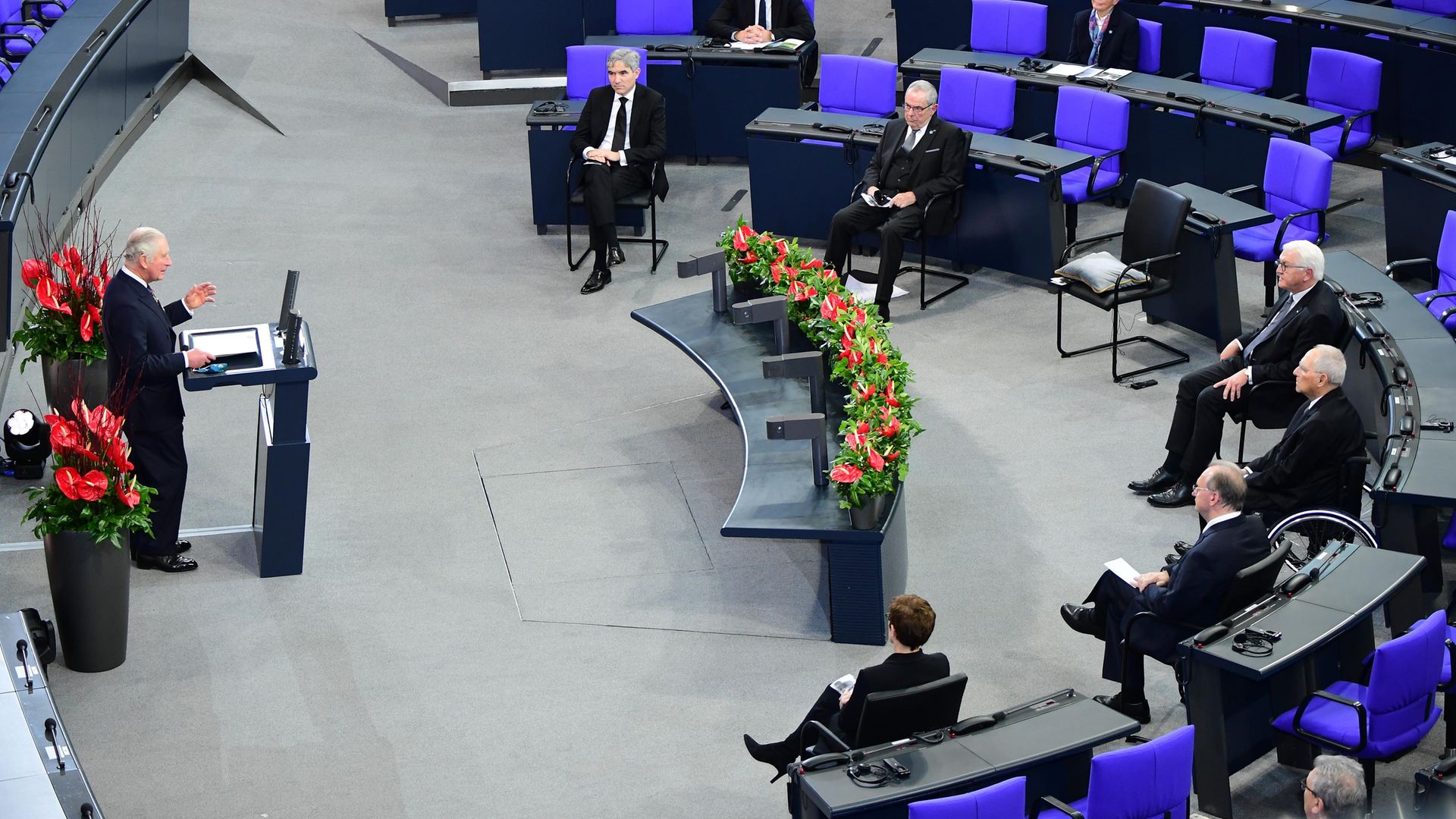
The Prince of Wales’ sombre trip to Germany suggests the royals might represent a continuing link to the continent, says former Europe minister DENIS MACSHANE.
In one of our more interesting royal forays into European politics, Prince Charles was in Berlin recently to be the star guest at the Bundestag for Germany’s national day of mourning for victims of war. Against the background of Brexit and Covid, the future king’s visit was almost reminiscent of Edward VII’s famous entente cordiale visit to Paris in 1903.
As everyone settles down to watch the latest series of The Crown – with its endless depiction of Charles as an adulterous nincompoop, pushed and pulled by his father, mother, and ‘grand-uncle’ – is it possible for him to be Britain’s hand stretched out to Europe? Can he do any good, after a decade in which British politicians opted for populist politics, at times crudely Europhobic, before and after the Brexit plebiscite?
For obvious reasons, the Germans cannot commemorate their war dead in the same manner as the British or the French. But every small German town has its memorial stone quietly hidden away. The national day of mourning is Germany’s equivalent of our Remembrance Day or the national public holiday in France on November 11, when every city and town holds memorial parades for the two world wars.
Last Sunday Charles, accompanied by a very queenly Camilla, laid a wreath at the Neue Wache in Berlin, as did Germany’s president, Frank-Walter Steinmeier, and his wife. This central memorial, designed by the leading neo-classical architect Karl Friedrich Schinkel, is dedicated to victims of war and tyranny. It is dominated by a sculpture, Mother with her Dead Son. This is the work of the great socialist German artist Käthe Kollwitz, who lost her son in the First World War and who died in 1945.
Later in his visit, in more than passable German and in contrast to the mostly monolingual English Brexiteer politicians, Charles addressed the German parliament. No doubt every word was cleared with the Foreign Office, but Charles quoted John Donne’s “No man is an island” and added: “One might equally argue that no country is really an island either, other than in the wholly literal sense.”
This is far from the anti-European rhetoric of much of the English political class in recent years. On Sunday, Moldova elected the strongly pro-EU Maia Sandu as its president. From Washington to Europe, populist and anti-European politicians are falling back in the polls – except, of course, in England.
Sending Charles to make a major speech in the heart of Europe’s dominant nation, full of tropes about friendship and cultural or academic links, or even the royal family’s connection to the German Prince Albert, was a smart use of royal diplomacy – particularly as no British politician from the present government can be taken seriously as a friend of Europe.
Even the Labour Party, which once built bridges to Europe’s centre-left political leadership, has shut down its pro-European voices, rather than face accusations of having doubts about Brexit.
In even the most optimistic scenario, Brexit will have a negative effect in economic terms, reducing the existing rights of all Brits, but especially younger ones, to travel, live, study, work or retire in Europe. Britain is self-isolating from Europe in a manner never before seen in recent history.
So can Charles and, perhaps, other royals keep a small flame of friendship between Britain and the rest of Europe alight? It would give them a role at a time when many are questioning the point of the royal establishment, watching with horror the antics portrayed in The Crown.
After Prince Charles’ speech, four young Europeans were asked to speak about Europe’s future. Violeta Avram from Moldova reminded the great and good of Germany, and the future King of England, that on the European continent there is an opponent of the EU’s values of peace, reconciliation and its rejection of the nationalist populism which twice last century plunged Europe into war. She pointed out that this leader does not shrink from war, takes every opportunity to divide the EU and would have relished Brexit.
She did not spell out Vladimir Putin’s name, but every German knew who she was talking about. Perhaps even Prince Charles got the message – and that Europe sees Brexit as a frightening win for the Putins of the world.
This article was originally produced for The Article









